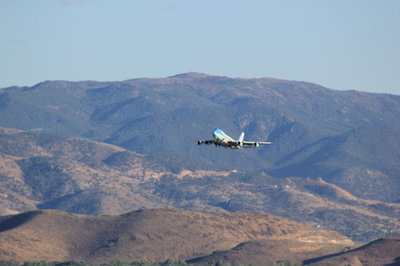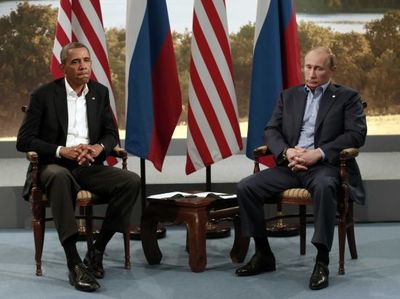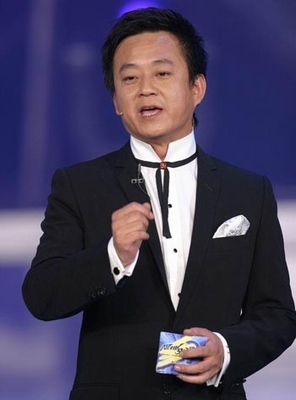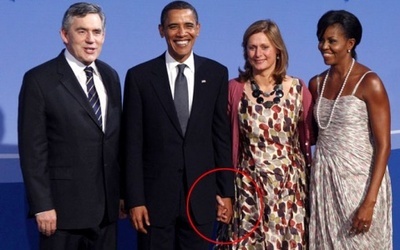What I'd like to do is to make some opening comments, and then whatI'm really looking forward to doing is taking questions, not onlyfrom students who are in the audience, but also we've receivedquestions online, which will be asked by some of the students whoare here in the audience, as well as by Ambassador Huntsman. And Iam very sorry that my Chinese is not as good as your English, but Iam looking forward to this chance to have a dialogue.
This is my first time traveling to China, and I'm excited to seethis majestic country. Here, in Shanghai, we see the growth thathas caught the attention of the world -- the soaring skyscrapers,the bustling streets and entrepreneurial activity. And just as I'mimpressed by these signs of China's journey to the 21st century,I'm eager to see those ancient places that speak to us from China'sdistant past. Tomorrow and the next day I hope to have a chancewhen I'm in Beijing to see the majesty of the Forbidden City andthe wonder of the Great Wall. Truly, this is a nation thatencompasses both a rich history and a belief in the promise of thefuture.
The same can be said of the relationship between our two countries.Shanghai, of course, is a city that has great meaning in thehistory of the relationship between the United States and China. Itwas here, 37 years ago, that the Shanghai Communique opened thedoor to a new chapter of engagement between our governments andamong our people. However, America's ties to this city -- and tothis country -- stretch back further, to the earliest days ofAmerica's independence.
In 1784, our founding father, George Washington, commissioned theEmpress of China, a ship that set sail for these shores so that itcould pursue trade with the Qing Dynasty. Washington wanted to seethe ship carry the flag around the globe, and to forge new tieswith nations like China. This is a common American impulse -- thedesire to reach for new horizons, and to forge new partnershipsthat are mutually beneficial.
Over the two centuries that have followed, the currents of historyhave steered the relationship between our countries in manydirections. And even in the midst of tumultuous winds, our peoplehad opportunities to forge deep and even dramatic ties. Forinstance, Americans will never forget the hospitality shown to ourpilots who were shot down over your soil during World War II, andcared for by Chinese civilians who risked all that they had bydoing so. And Chinese veterans of that war still warmly greet thoseAmerican veterans who return to the sites where they fought to helpliberate China from occupation.
A different kind of connection was made nearly 40 years ago whenthe frost between our countries began to thaw through the simplegame of table tennis. The very unlikely nature of this engagementcontributed to its success -- because for all our differences, bothour common humanity and our shared curiosity were revealed. As oneAmerican player described his visit to China -- "[The]people arejust like us…The country is very similar to America, but still verydifferent."
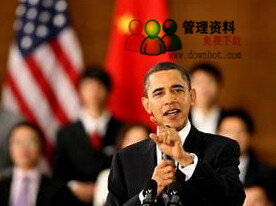
Of course this small opening was followed by the achievement of theShanghai Communique, and the eventual establishment of formalrelations between the United States and China in 1979. And in threedecades, just look at how far we have come.
In 1979, trade between the United States and China stood at roughly$5 billion -- today it tops over $400 billion each year. Thecommerce affects our people's lives in so many ways. Americaimports from China many of the computer parts we use, the clotheswe wear; and we export to China machinery that helps power yourindustry. This trade could create even more jobs on both sides ofthe Pacific, while allowing our people to enjoy a better quality oflife. And as demand becomes more balanced, it can lead to evenbroader prosperity.
In 1979, the political cooperation between the United States andChina was rooted largely in our shared rivalry with the SovietUnion. Today, we have a positive, constructive and comprehensiverelationship that opens the door to partnership on the key globalissues of our time -- economic recovery and the development ofclean energy; stopping the spread of nuclear weapons and thescourge of climate change; the promotion of peace and security inAsia and around the globe. All of these issues will be on theagenda tomorrow when I meet with President Hu.
And in 1979, the connections among our people were limited. Today,we see the curiosity of those ping-pong players manifested in theties that are being forged across many sectors. The second highestnumber of foreign students in the United States come from China,and we've seen a 50 percent increase in the study of Chinese amongour own students. There are nearly 200 "friendship cities" drawingour communities together. American and Chinese scientists cooperateon new research and discovery. And of course, Yao Ming is just onesignal of our shared love of basketball -- I'm only sorry that Iwon't be able to see a Shanghai Sharks game while I'mvisiting.
It is no coincidence that the relationship between our countrieshas accompanied a period of positive change. China has liftedhundreds of millions of people out of poverty -- an accomplishmentunparalleled in human history -- while playing a larger role inglobal events. And the United States has seen our economy growalong with the standard of living enjoyed by our people, whilebringing the Cold War to a successful conclusion.
There is a Chinese proverb: "Consider the past, and you shall knowthe future." Surely, we have known setbacks and challenges over thelast 30 years. Our relationship has not been without disagreementand difficulty. But the notion that we must be adversaries is notpredestined -- not when we consider the past. Indeed, because ofour cooperation, both the United States and China are moreprosperous and more secure. We have seen what is possible when webuild upon our mutual interests, and engage on the basis of mutualrespect.
And yet the success of that engagement depends upon understanding-- on sustaining an open dialogue, and learning about one anotherand from one another. For just as that American table tennis playerpointed out -- we share much in common as human beings, but ourcountries are different in certain ways.
I believe that each country must chart its own course. China is anancient nation, with a deeply rooted culture. The United States, bycomparison, is a young nation, whose culture is determined by themany different immigrants who have come to our shores, and by thefounding documents that guide our democracy.
Those documents put forward a simple vision of human affairs, andthey enshrine several core principles -- that all men and women arecreated equal, and possess certain fundamental rights; thatgovernment should reflect the will of the people and respond totheir wishes; that commerce should be open, information freelyaccessible; and that laws, and not simply men, should guarantee theadministration of justice.
Of course, the story of our nation is not without its difficultchapters. In many ways -- over many years -- we have struggled toadvance the promise of these principles to all of our people, andto forge a more perfect union. We fought a very painful civil war,and freed a portion of our population from slavery. It took timefor women to be extended the right to vote, workers to win theright to organize, and for immigrants from different corners of theglobe to be fully embraced. Even after they were freed, AfricanAmericans persevered through conditions that were separate and notequal, before winning full and equal rights.
None of this was easy. But we made progress because of our beliefin those core principles, which have served as our compass throughthe darkest of storms. That is why Lincoln could stand up in themidst of civil war and declare it a struggle to see whether anynation, conceived in liberty, and "dedicated to the propositionthat all men are created equal" could long endure. That is why Dr.Martin Luther King could stand on the steps of the Lincoln Memorialand ask that our nation live out the true meaning of its creed.That's why immigrants from China to Kenya could find a home on ourshores; why opportunity is available to all who would work for it;and why someone like me, who less than 50 years ago would have hadtrouble voting in some parts of America, is now able to serve asits President.
And that is why America will always speak out for these coreprinciples around the world. Wedo not seek to impose any system of government on any other nation,but we also don't believe that the principles that we stand for areunique to our nation. These freedoms of expression and worship --of access to information and political participation -- we believeare universal rights. They should be available to all people,including ethnic and religious minorities -- whether they are inthe United States, China, or any nation. Indeed, it is that respectfor universal rights that guides America's openness to othercountries; our respect for different cultures; our commitment tointernational law; and our faith in the future.
These are all things that you should know about America. I alsoknow that we have much to learn about China. Looking around at thismagnificent city -- and looking around this room -- I do believethat our nations hold something important in common, and that is abelief in the future. Neither the United States nor China iscontent to rest on our achievements. For while China is an ancientnation, you are also clearly looking ahead with confidence,ambition, and a commitment to see that tomorrow's generation can dobetter than today's.
In addition to your growing economy, we admire China'sextraordinary commitment to science and research -- a commitmentborne out in everything from the infrastructure you build to thetechnology you use. China is now the world's largest Internet user-- which is why we were so pleased to include the Internet as apart of today's event. This country now has the world's largestmobile phone network, and it is investing in the new forms ofenergy that can both sustain growth and combat climate change --and I'm looking forward to deepening the partnership between theUnited States and China in this critical area tomorrow. But aboveall, I see China's future in you -- young people whose talent anddedication and dreams will do so much to help shape the 21stcentury.
I've said many times that I believe that our world is nowfundamentally interconnected. The jobs we do, the prosperity webuild, the environment we protect, the security that we seek -- allof these things are shared. And given that interconnection, powerin the 21st century is no longer a zero-sum game; one country'ssuccess need not come at the expense of another. And that is whythe United States insists we do not seek to contain China's rise.On the contrary, we welcome China as a strong and prosperous andsuccessful member of the community of nations -- a China that drawson the rights, strengths, and creativity of individual Chinese likeyou.
To return to the proverb -- consider the past. We know that more isto be gained when great powers cooperate than when they collide.That is a lesson that human beings have learned time and again, andthat is the example of the history between our nations. And Ibelieve strongly that cooperation must go beyond our government. Itmust be rooted in our people -- in the studies we share, thebusiness that we do, the knowledge that we gain, and even in thesports that we play. And these bridges must be built by young menand women just like you and your counterparts in America.
That's why I'm pleased to announce that the United States willdramatically expand the number of our students who study in Chinato 100,000. And these exchanges mark a clear commitment to buildties among our people, as surely as you will help determine thedestiny of the 21st century. And I'm absolutely confident thatAmerica has no better ambassadors to offer than our young people.For they, just like you, are filled with talent and energy andoptimism about the history that is yet to be written.
So let this be the next step in the steady pursuit of cooperationthat will serve our nations, and the world. And if there's onething that we can take from today's dialogue, I hope that it is acommitment to continue this dialogue going forward.
So thank you very much. And I look forward now to taking somequestions from all of you. Thank you very much. (Applause.)
 爱华网
爱华网